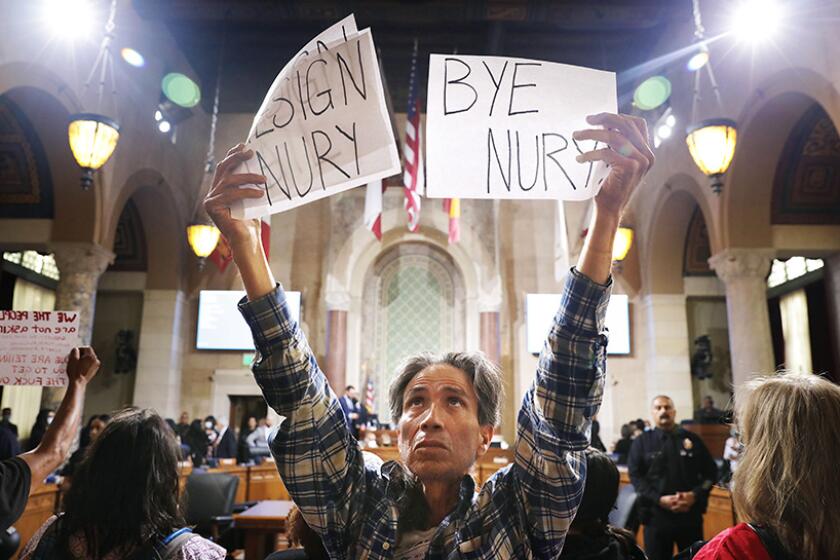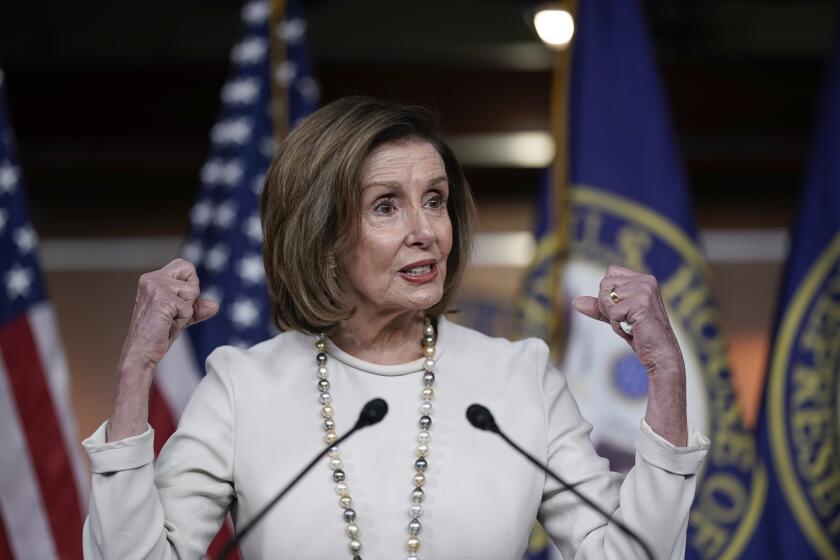Column: Worried about another American civil war? It’s not imminent, but ...

- Share via
I don’t believe the United States is on the verge of civil war.
I don’t believe it even though a substantial portion of Americans support political violence and despite chilling examples ranging from the scheme to kidnap Michigan Gov. Gretchen Whitmer to the Jan. 6 assault on the Capitol to the brutal beating of Paul Pelosi to the increase in armed right-wing activity.
I don’t believe it despite warnings from experts that it’s coming.
“America is rushing headlong into another civil war, and it’s a matter of when, not if,” Christopher Sebastian Parker, a UC Santa Barbara political science professor, told the Guardian in an article last month titled “How close is the U.S. to civil war?”
Opinion Columnist
Nicholas Goldberg
Nicholas Goldberg served 11 years as editor of the editorial page and is a former editor of the Op-Ed page and Sunday Opinion section.
Stephen Marche, author of “The Next Civil War: Dispatches from the American Future,” said: “The United States is a textbook example of a country headed for civil war.” Conditions, he said are “ripe for political violence.”
“They are preparing for war,” said Barbara Walter, a political science professor at UC San Diego, to the Washington Post. “And not talking about it doesn’t make us safer.”
And I don’t believe it even though those dire prophecies are buttressed, to some extent, by public opinion.
For instance, a solid minority of Americans — in the 20% range — say violence can be justified to “advance an important political objective.” Furthermore, according to the Pew Research Center, Americans see their political opponents as more “close-minded, dishonest, immoral and unintelligent” than other Americans. Nearly 9 out of 10 voters expressed concern to pollsters last month about the increased risk of politically motivated violence.
Despite all that, I think this country has a ways to go before we take to our bunkers. Call me a starry-eyed optimist (or a self-delusional fool), but I believe that most Americans still share a fundamental respect for rules, laws and institutions, a respect built over 200-plus years of history. The vast majority of Americans are not on the violent fringes but buy into the basic expectations and benefits of democratic society.
Some leaks are justified and some are not. We ought to keep that in mind before we punish the perpetrators.
I don’t believe you topple that with one bum presidency or a handful of divisive Supreme Court decisions or some horn-hatted, flag-wielding vigilantes storming the Capitol, or even with sporadic right-wing extremist violence. Will there be conflict and more violent incidents ahead? Yes, probably. Sustained warfare or guerrilla insurrection? Not right now.
But here’s where I switch arguments a bit. Because I also believe — as a person whose family was forced to upend its stable, settled existence when Hitler came to power — that this is no time for complacency, either.
I’ve seen signs of upheaval in this country in the last seven years that I couldn’t have imagined just a few years earlier. Two presidential impeachments within 13 months — the same number there were in the previous 230 years. Two-thirds of Republicans convinced President Biden was not fairly elected. Twitter mentions of “civil war” up by nearly 3,000% after the FBI search of Mar-a-Lago in August. Hate crimes increasing around the country.
If I were to worry, if I were to wake up at night in a sweat fearing for my country, here’s one thing I would definitely focus on: Our political system no longer seems to work. Government is stymied, paralyzed and rancorous.
Even when one party wins a majority it accomplishes little. The filibuster is an immense obstacle to legislative action in the Senate, allowing little to get done except through gimmickry and procedural machinations. The hurdles to amending the Constitution are virtually insurmountable; some experts believe it will never happen again.
Too often in the fight to protect civilians around the world against atrocities and genocide, the United States does not do enough. Why is that?
The governing process as it’s now practiced doesn’t encourage deliberation, compromise or the common good at all; instead, it rewards scorched-earth conflict with your enemies. Winning matters; governing not so much.
For voters, this creates intense frustration that threatens to boil over. If working within the system doesn’t improve things, voters will eventually reject the system. If elections yield no meaningful benefits, Americans will lose faith in voting. If they feel misled, mistreated and undervalued by Washington, they will become angry and disenchanted, lose faith in institutions, and turn elsewhere for solutions, including to demagogues.
Consider abortion, although it’s just one of example of many. Thanks to the Supreme Court’s decision in Dobbs vs. Jackson Women’s Health Organization, the United States no longer recognizes a constitutional right to abortion, even though more than 60% of Americans believes the process should be legal in most or all cases.
So, OK, fine; in a healthy political system, Congress would now pass a law codifying abortion rights nationally, in line with the desire of most Americans. But the legislative branch is broken and can’t respond. Despite popular support, the proposed bill lacks the votes to overcome the 60-vote filibuster requirement in the Senate.
The left and right both feel the frustration. According to Pew, only 8% of Americans see government as very or extremely responsive to the needs of ordinary citizens. Dissatisfaction with Washington is one of the few things on which Republicans and Democrats agree.
With the midterms behind them, House members and senators — including dozens of individual legislators either defeated or retiring — feel freer to vote as they choose.
In our system today, incumbents are virtually unbeatable; money corrupts elections; political parties gerrymander voting district lines for unfair advantage. The candidate with the most votes doesn’t necessarily become president. States of fewer than a million residents have the same representation in the Senate as those with tens of millions of people.
And it’s not clear what can be done about it.
In the years ahead, the U.S. could calm down and revert to the old status quo, or perhaps the Cassandras are right and we’ll face a literal civil war or a sustained guerrilla insurrection or a “cold” civil war characterized, as some have speculated, by partisanship, mistrust and paralysis.
If we hope to avoid those latter outcomes, government needs to become responsive to the needs of the voters.
More to Read
A cure for the common opinion
Get thought-provoking perspectives with our weekly newsletter.
You may occasionally receive promotional content from the Los Angeles Times.















